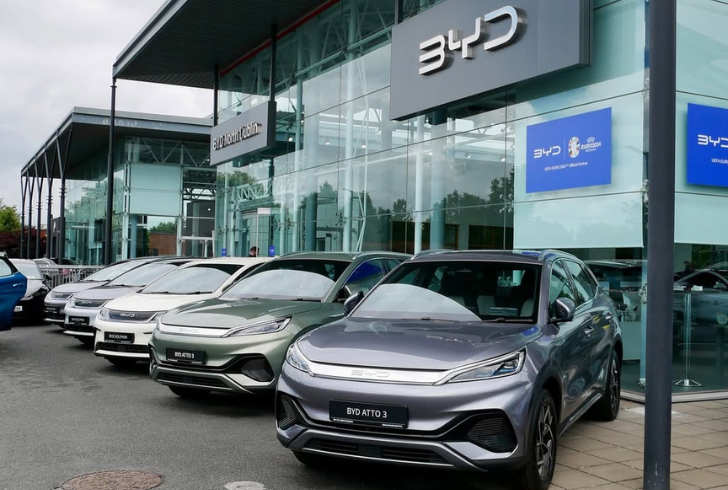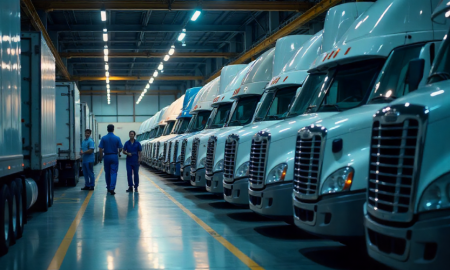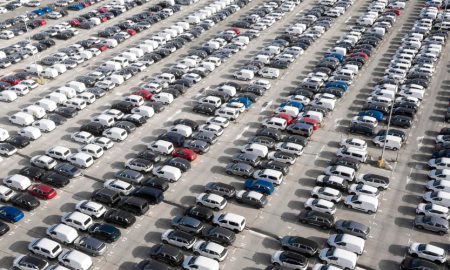
Auto Industry Faces More Challenges in 2025, Experts Warn

The auto industry is heading toward a challenging 2025, with multiple factors reshaping its landscape. Tariff threats, rising costs, and obstacles in electric vehicle (EV) adoption continue to create uncertainty. Meanwhile, experts at the 31st Annual Automotive Symposium, held at the Detroit branch of the Federal Reserve Bank of Chicago, discussed these pressing concerns.
Their insights highlighted the key challenges that will likely impact manufacturers, suppliers, and consumers in the coming year.
Key Concerns Impacting the Auto Sector
Several critical issues are affecting the industry. Among them, three stand out the most:
1. Vehicle ownership costs continue to rise, with average monthly payments exceeding $750 due to high interest rates.
2. Chinese automakers, such as BYD Auto, may enter the U.S. market, but their success will likely depend on federal trade policies.
3. The U.S. light vehicle market is still recovering from the economic setbacks caused by the COVID-19 pandemic.

Instagram | byd_north_dublin | BYD Auto may enter the US market but federal trade policies could decide its success.
Kristin Dziczek, a policy adviser for the Federal Reserve Bank of Chicago, emphasized how rapidly the industry is changing. She pointed out that vehicle technologies, fuel sources, and infrastructure requirements are all evolving. However, she also highlighted a fundamental truth:
“What never changes is people need a car,” Dziczek stated. “The U.S. is a large country.”
Shifting Policies and Their Impact on the Industry
Government regulations continue to shape the auto industry’s future. Federal policies on emissions, trade agreements, and EV incentives directly influence how automakers operate. While some industry leaders welcome deregulation efforts, others worry that sudden changes could lead to instability. As a result, companies are closely monitoring how these shifts will affect their long-term strategies.
California’s Ban on Gas-Powered Cars Raises Concerns
One of the biggest concerns involves California’s decision to ban the sale of new internal combustion engine vehicles by 2030. This policy could set a precedent, leading other states to implement similar measures. Dave Schwietert, a former chief policy adviser at the Alliance for Automobile Manufacturers, warned that these changes could have significant consequences for the industry.
“The U.S. must remain competitive in the years ahead,” Schwietert said. “Manufacturers, suppliers, and consumers all need to understand the impact of California’s ban.”
Additionally, fuel economy standards, shifting trade agreements, and increasing global competition continue to create uncertainty. Many experts anticipate regulatory rollbacks that would undo policies introduced under President Joe Biden. Consequently, automakers are bracing for a period of adjustment.
“This isn’t about whether we can push for higher standards,” Schwietert explained. “It’s about ensuring that expectations align with reality.”
Global Trade Tensions and Tariff Threats
The auto sector plays a crucial role in U.S. manufacturing, accounting for nearly half of production. As a result, changes in global trade policies have far-reaching consequences. Tariff threats remain a major concern, as they could impact vehicle prices, supply chains, and overall market stability.

Instagram | EyeEm | Global trade tensions impact the auto industry.
Everett Eissenstat, a partner at Squire Patton Boggs and former senior executive at General Motors, highlighted the significance of these trade challenges.
“Tariff threats are shaking up the global market,” Eissenstat stated. “No economy is completely safe. The European Union, Japan, and Korea will all feel the effects of these policy changes.”
Meanwhile, economic instability raises concerns among investors. When market conditions appear uncertain, businesses struggle to secure the funding needed for research, development, and expansion. If that happens, automakers may face financial roadblocks that could hinder future growth.
The Road Ahead for the Auto Industry
The automotive sector is at a turning point. Rising costs, regulatory changes, and global trade tensions continue to reshape the industry. Nevertheless, adaptation remains key. Automakers, suppliers, and policymakers must work together to find solutions that balance affordability, innovation, and sustainability.
As 2025 approaches, staying informed and prepared will be more important than ever. The industry’s ability to navigate these challenges will determine its long-term success. By making strategic decisions now, businesses can ensure a more stable and competitive future.
More inAuto News
-
`
Why Truck Manufacturers Are Shifting from Diesel to Hydrogen
Hydrogen is emerging as a promising alternative for trucks, offering both high energy efficiency and longer driving ranges. Ashok Leyland, for...
October 2, 2025 -
`
Ohio Driver’s License Laws Are Changing for Young Adults in 2025
Getting a driver’s license is a milestone, but for young adults in Ohio, the process is about to become more structured....
September 25, 2025 -
`
Why 1 in 4 Americans Trust RFK Jr. for Medical Advice
A recent poll reveals that a significant portion of Americans remain cautious about trusting Health Secretary Robert F. Kennedy Jr.’s medical...
September 19, 2025 -
`
Why Tariffs Could Make Car Insurance Rates Worse
Car insurance costs in the U.S. are climbing, and new tariffs could make the problem worse. Shoppers are already feeling the...
September 11, 2025 -
`
The Automotive Reckoning Has Arrived – Are Companies Ready?
In early 2022, Stellantis CEO Carlos Tavares stood on stage in Amsterdam with a confident blueprint for the future. Fresh off...
September 5, 2025 -
`
Self-Driving Cars Will “Drastically” Change Automotive Design, GM Says
The automotive industry is entering a new chapter that goes far beyond electrification. While EVs dominate today’s headlines, the rise of...
August 29, 2025 -
`
Child Wearing Swimsuit Outside Sparks CPS Visit — The Full Story!
Children playing outside is a familiar and often joyful sight. Yet, sometimes, an innocent choice—like a child wearing a swimsuit outdoors—can...
August 22, 2025 -
`
Florida Auto Insurance Rates Finally Drop. But for How Long?
After years of rising premiums, Florida drivers are finally seeing lower auto insurance rates on the horizon. For 2025, the state’s...
August 15, 2025 -
`
U.S. Reduces Tariffs on Japanese Cars to 15% Under Trump’s Deal
In a move reshaping U.S.-Japan trade relations, former President Donald Trump confirmed a new agreement that slashes tariffs on Japanese car...
August 9, 2025















You must be logged in to post a comment Login